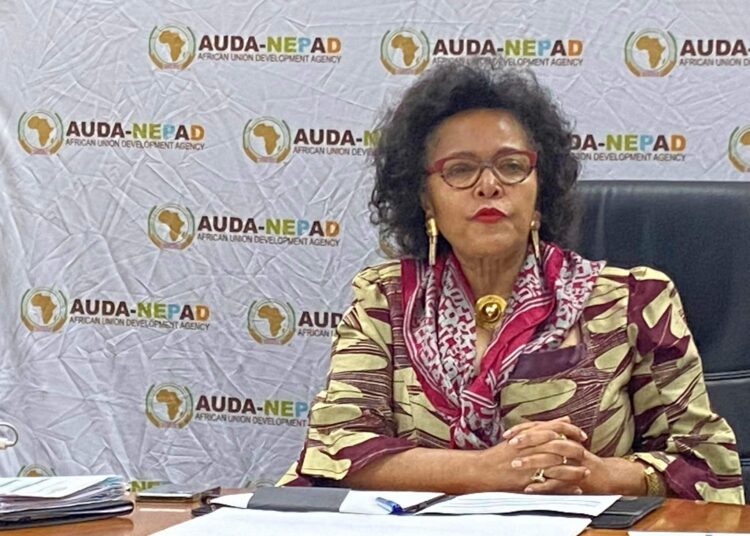The ten-year implementation plan (2013-2063) of Agenda 2063 still raises questions, even as it is drawing to a close.
This implementation has been deeply affected by coronavirus and geopolitical changes happening around the world.
In this interview with the Egyptian Mail, Chief Executive Officer of the Africa Union Development Agency – New Partnership for Africa’s Development (AUDA – NEPAD), Nardos Bekele-Thomas, the first woman to lead the agency, speaks about plan developments and the vital role of youth whom she described as an ‘integral of sustainable development’ in the continent.
Ms Bekele-Thomas the AUDA-NEPAD CEO referred to a wide range of programmes that are being implemented in all sectors.
Digitalisation, she said, is a basic part of all these programmes.
She described the Centre of Excellence: Science and Technology and Innovation Hub as a major programme of the AUDA-NEPAD.
“We are proud of many of the programmes that have been accomplished over the years,” Ms Bekele-Thomas said enthusiastically.
The AUDA-NEPAD programmes include economic integration, industrialisation, human capital, the development of institutions and environmental sustainability.
According to Ms Bekele-Thomas, the AUDA-NEPAD also focuses on agriculture and food systems.
The agency, she said, takes into consideration that the African Union theme for this year is related to nutrition and food security.
“Agriculture is strongly connected with everything, including health,” she said.
She said her agency has many programmes in this regard, such as the Food and Nutrition Security Programme which focuses on building the capacities of policy-makers and experts and enhances the required research.
She described food security as a ‘critical file’.
Speaking about the ten-year implementation plan, Ms Bekele-Thomas said the first thing her agency did was to consolidate what had already been achieved with the aim of building on it.
“It is important to fill in gaps, link the dots and make sure that our activities in the continent are really coordinated,” CEO of AUDA – NEPAD said.
She added that the ten-year implementation plan is part of a series of five ten-year plans.
It is, she said, the basis for the preparation for medium-term development plans of AU member states, the Regional Economic Communities and AU Organs.
She highlighted the need for defining innovation and development accelerators to figure out whether they are performing or not and whether they are responding to the needs of the communities or not.
Ms Bekele-Thomas noted that the AUDA-NEPAD tries to make effective use of limited resources.
She underscored the importance of engaging all stakeholders in reviewing and coordinating the implementation plan to get the views on paper to activate the process.
“We want Africans to know that they have a vision,” Ms Bekele-Thomas said. “So vision 2063 should be Africans’ vision.”
She added that each African citizen should know what the vision is all about.
She called for involving young Africans in the vision because it defines the future.
“Agenda 2063 is not about us, but about young people,” Ms Bekele-Thomas said. “Therefore, they have to embrace it.”
She said media plays an important role in reshaping narratives on Africa and disseminating information about on-going progress in the continent.
“We want to move Africa from being defined by poverty and tell the stories of Africa’s transformation through African voices,” she added.
The NEPAD is the economic development arm of the African Union. It was adopted at the 37th session of the Assembly of Heads of State and Government in July 2001 in Lusaka, Zambia.
Since its inception, the AUDA-NEPAD has been considering youth as a top priority for its programmes. It works to help youth reach their full potential.
This goes hand in hand with the fact that Africa is a young continent with a population of 1.4 billion. Youth make the vast majority of this youth, numbering 725 million.
‘Energize Africa’ was one of the key programmes recently launched by the AUDA-NEPAD in tandem with the Youth Charter Proclamation.
The programme was launched in partnership with Afreximbank on the side-lines of the 77th United Nations General Assembly in New York, on 19 September 2022.
African youth, Ms Bekele-Thomas said, have to be the voice of the future and what they aspire to see in Africa.
“Energise Africa is about everybody,” she said. We have to make it our business and your business and everybody’s business.”
She added that everyone in the continent should be promoting the ‘Africa We Want’ blueprint.
She explained that Energise Africa has three components and builds on what exists.
Ms Bekele-Thomas said the programme tries to become a platform for everybody to speak up.
She added that the programme works to build capacities in public service and upgrade the efficiency and quality of the services offered to people.
“We train people working in these fields, give them skills and retool them,” Ms Bekele-Thomas said. “We then inject them into the public sector and make them part of public service.”
She said African youth are badly in need of a facility that would help them let their innovative abilities out.
“The flagship programme ‘Energise Africa’ also aspires to have well-skilled cadres with genuine passion for Pan-Africanism,” Ms Bekele-Thomas said. “This requires a lot of resources.”






Discussion about this post